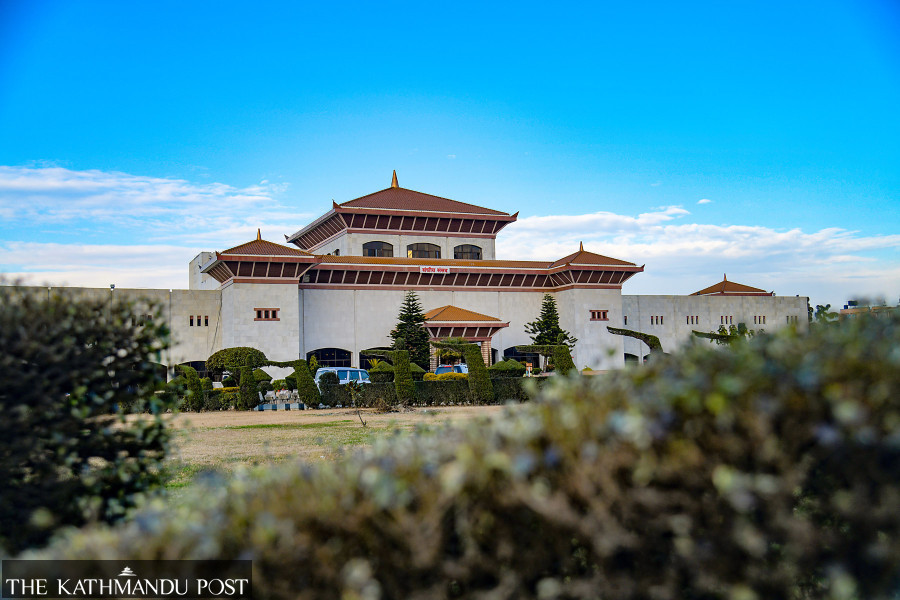National
House committee likely to decide on transitional justice bill within a week
The committee is likely to advance the bill with a vote as chances of a consensus look slim.
Post Report
The Law, Justice and Human Rights Committee of Parliament is all set to forward the bill to amend the transitional justice law to the House of Representatives through a vote if the efforts for consensus fail to yield results within a week.
With no sign of consensus between the ruling and opposition parties on some of the provisions, the House committee is in no mood to wait further. The bill to amend the Enforced Disappearances Enquiry, Truth and Reconciliation Commission Act, registered in the Parliament in March last year, is under consideration in the House committee.
“We still want the bill to be finalised unanimously but we cannot wait further,” Bimala Subedi, chairperson of the committee, told the Post. “The bill will be forwarded to the lower house through a vote within a week if the consensus bid fails.”
Of late, the ruling party lawmakers have been saying the House committee shouldn’t hold the bill further.
In the House committee’s meeting on Friday, Nepali Congress Chief Whip Ramesh Lekhak proposed to clear the bill from the committee by Wednesday at the latest.
“Let’s try to find the meeting points for the next couple of days. If that fails, the House committee must proceed with a vote,” he said.
The ruling alliance holds a comfortable majority in both the House committee and Parliament. Hence, if the ruling parties want, the bill can easily get through the parliamentary process.
Subedi said the House committee meeting will be called on Monday or Tuesday to discuss the bill. The ruling parties want the Act to be amended from the ongoing parliamentary session. Prime Minister Pushpa Kamal Dahal has also announced that the stalled transitional justice process would be brought on track by amending the Act without delay. “The amendment bill will be presented in the House within a few days,” he announced in a programme on Friday.
Multiple attempts to reach a consensus on the bill have failed as the ruling parties and main opposition CPN-UML have refused to budge from their positions.
The parties have differences mainly on four points of the bill. The House panel is struggling to decide whether to categorise arbitrary killings or all killings except those that occurred during clashes as serious violations of human rights. It also has been unable to settle what happens in case the victims of human rights violations refuse to reconcile.
The parties also have differences in ways to address the concerns of those who were affected by the conflict even though they were not directly involved in it. Meanwhile, cross-party lawmakers also have differences over reduced sentencing. Though there is an agreement that the penalty for the perpetrators who cooperate in the investigation can be reduced, they have yet to agree on the extent of such reduction.
Currently, the main opposition’s stance largely aligns with the concerns of the conflict victims and human rights activists. Conflict victims have been saying extrajudicial killings, murder of unarmed individuals or all unlawful killings should be mentioned as serious human rights violations. They have demanded that serious mental and physical torture should also be listed as grave violations of human rights, thus non-amnestiable.
The victims say every case where there is no reconciliation should be prosecuted. They insist that the authority to reduce penalties should rest with the judiciary and that it would be wrong to mention the penalty reduction in the Act itself.
The UML maintains that an amendment bill will be meaningless unless it is acceptable to the victims and the international communities and is in line with a 2015 Supreme Court ruling. The apex court had directed the authorities not to have amnesty provisions for serious violations of human rights and to categorise crimes as amnestiable and non-amnestiable. The ruling parties claim the existing bill is in line with the court’s verdict.
The parliamentary committee has agreed to give four years to the Commission of Investigation on Enforced Disappeared Persons and the Truth and Reconciliation Commission to investigate victims’ complaints and deliver justice. Looking at the volume of the cases, the conflict victims have demanded a provision for the possibility of term extensions for the commissions if they fail to complete their jobs in four years. They have also said three months should be allotted to register complaints for those who haven’t already done so.
In line with the ruling parties, a section of conflict victims too is demanding an immediate endorsement of the bill. Presenting a memorandum to Prime Minister Dahal on February 18, they said the consultation by the government, coupled with the new provisions in the amendment bill establishing reparation as right, setting up separate investigation units within the Truth and Reconciliation Commission, and allowing a window to register new complaints, have raised their hope for justice.




 9.7°C Kathmandu
9.7°C Kathmandu













